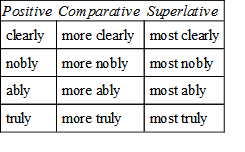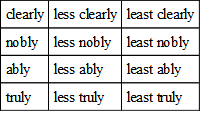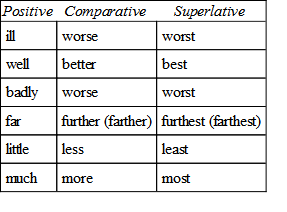 полная версия
полная версияPlain English
HOW TO TELL ADVERBS
283. We need not have much difficulty in always being able to tell which words in a sentence are adverbs, for they will always answer one of the following questions: How? When? Where? Why? How long? How often? How much? How far? or How little? etc. Just ask one of these questions and the word that answers it is the adverb in your sentence. Take the following sentence:
He always came down too rapidly.
The word always answers the question when. So always is an adverb, describing the time of the action expressed in the verb came—He always came. Down answers the question where. So down is the adverb describing the place of the action. Rapidly answers the question how, and is the adverb describing the manner of the action. Too also answers the question how, and modifies the adverb rapidly.
Exercise 1
Underscore the adverbs in the following sentences and tell which word they modify:
1. He writes correctly.
2. She answered quickly.
3. A very wonderful future awaits us.
4. You should not speak so hastily.
5. You can speak freely here.
6. He could never wait patiently.
7. We very often make mistakes.
8. She very seldom goes there.
9. He usually walks very rapidly.
10. I have read the lesson quite carefully.
11. We would willingly and cheerfully give our all for the cause.
12. He frequently comes here but I do not expect him today.
13. If we work diligently and faithfully we will soon learn to speak correctly and fluently.
14. I am almost sure I can go there tomorrow.
15. It was more beautifully painted than the other.
16. We eagerly await the news from the front.
17. He always gladly obeyed his father.
18. She spoke quite simply and met with a very enthusiastic reception.
19. The difficulty can be easily and readily adjusted.
Exercise 2
Use the following adverbs in sentences to modify verbs:
slowly
here
now
gently
loudly
never
soon
carefully
nobly
down
seldom
easily
Use the following adverbs in sentences to modify adjectives:
quite
very
more
too
most
less
nearly
so
Use the following adverbs in sentences to modify adverbs:
too
very
quite
less
more
most
least
so
CLASSES OF ADVERBS
284. There are a good many adverbs in our language, yet they may be divided, according to their meaning, into six principal classes:
1. Adverbs of time. These answer the question when, and are such adverbs as now, then, soon, never, always, etc.
2. Adverbs of place. These answer the question where, and are such adverbs as here, there, yonder, down, above, below, etc.
3. Adverbs of manner. These answer the question how, and are such adverbs as well, ill, thus, so, slowly, hastily, etc.
4. Adverbs of degree. These answer the questions how much, how little, how far, etc., and are such adverbs as much, very, almost, scarcely, hardly, more, quite, little, etc.
5. Adverbs of cause. These answer the question why, and are such adverbs as therefore, accordingly, hence, etc.
6. Adverbs of number. These are such adverbs as first, second, third, etc.
Exercise 3
In the following sentences there are adverbs of each class used. Find the adverbs of the different classes.
1. We shall always be found in the forefront of the struggle.
2. It is much more effective to train the young.
3. He came first and remained through the entire program.
4. It is pleasant to know that we have done well.
5. Our comrades are fighting yonder in the trenches.
6. Therefore we shall never acknowledge defeat.
7. Come down and discuss the matter with us.
8. We would soon be able to agree if we understood the facts.
9. Study your lessons slowly and carefully.
10. He was scarcely able to tell his story.
11. Accordingly I am sending you full particulars of the plan.
12. He came third in the ranks.
INTERROGATIVE ADVERBS
285. The adverbs how, when, where, why, whither, whence, etc., are used in asking questions, and when they are used in this way they are called interrogative adverbs. For example:
How did it happen?
Where are you going?
Whence came he?
When did he come?
Why did you do it?
Whither are you going?
These adverbs, how, when, where, why, whence and whither, are used in these sentences to modify the verbs and ask the questions concerning the time or place or manner of action expressed in the verb.
How may also be used as an interrogative adverb modifying an adjective or another adverb. For example:
How late did he stay?
How large is the house?
In the first sentence, the adverb how modifies the adverb late, and introduces the question. In the second sentence how modifies the adjective large and introduces the question.
Exercise 4
Write sentences containing the interrogative adverbs how, when, where and why, to modify verbs and ask simple questions.
Write sentences using the interrogative adverb how to modify an adjective and an adverb and to introduce a question.
ADVERBS OF MODE
286. There are some adverbs which scarcely fall into any of the above classes and cannot be said to answer any of these questions. They are such adverbs as indeed, certainly, fairly, truly, surely, perhaps and possibly. These adverbs really modify the entire sentence, in a way, and are used to show how the statement is made,—whether in a positive or negative way or in a doubtful way. For example:
Surely you will not leave me.
Truly I cannot understand the matter as you do.
Perhaps he knows no better.
Indeed, I cannot go with you.
Here, these adverbs, truly, surely, perhaps and indeed, show the manner in which the entire statement is made; so they have been put in a class by themselves and called adverbs of mode. Mode means literally manner, but these are not adverbs that express manner of action, like slowly or wisely or well or ill. They express rather the manner in which the entire statement is made, and so really modify the whole sentence.
PHRASE ADVERBS
287. We have certain little phrases which we have used so often that they have come to be used and regarded as single adverbs. They are such phrases as of course, of late, for good, of old, at all, at length, by and by, over and over, again and again, through and through, hand in hand, ere long, in vain, to and fro, up and down, as usual, by far, at last, at least, in general, in short, etc. These words which we find used so often in these phrases we may count as single adverbs.
ADJECTIVES AND ADVERBS
288. Sometimes the same word may be used either as an adjective or as an adverb, and you may have some difficulty in telling whether it is an adjective or an adverb. Some of these words are: better, little, late, far, hard, further, first, last, long, short, much, more and high. For example:
The late news verifies our statement.
The man came late to his work.
In the first sentence, the word late is used as an adjective modifying the noun news. In the second sentence, the word late is used as an adverb to modify the verb came.
289. You can always distinguish between adjectives and adverbs by this rule: Adjectives modify only nouns and pronouns, and the one essential characteristic of the adverb, as a limiting word, is that it is always joined to some other part of speech than a noun. An adverb may modify a verb, adjective or other adverb, but never a noun or pronoun.
You recall the rule which we have made the very foundation of our study: namely, that every word is classified in the sentence according to the work which it does in that sentence. So a word is an adjective when it limits or modifies or qualifies a noun or pronoun; a word is an adverb when it qualifies any part of speech other than a noun or pronoun, either a verb or an adjective or an adverb, or even an entire sentence, as is the case with adverbs of mode.
290. Many adverbs are regularly made from nouns and adjectives by prefixes and suffixes. Adverbs are made from adjectives chiefly by adding the suffix ly, or by changing ble to bly. For example: honestly, rarely, dearly, ably, nobly, feebly. But all words that end in ly are not adverbs. Some adjectives end in ly also, as, kingly, courtly, etc. The only way we can determine to which class a word belongs is by its use in the sentence.
Exercise 5
In the following sentences, tell whether the words printed in italics are used as adjectives or as adverbs: also note the words ending in ly. Some are adverbs and some adjectives.
1. The boy was very little.
2. It was a little early to arrive.
3. It was a hard lesson.
4. She works hard every day.
5. I read the first book.
6. I read the book first then gave it to him.
7. He went to a high mountain.
8. The eagle flew high in the air.
9. We saw clearly the lovely picture.
10. He is a wonderfully jolly man.
11. His courtly manner failed when he saw his homely bride.
12. He speaks slowly and clearly.
13. They are very cleanly in their habits.
NOUNS AS ADVERBS
291. Words that are ordinarily used as nouns, are sometimes used as adverbs. These are the nouns that denote time, distance, measure of value or direction. They are added to verbs and adjectives to denote the definite time at which a thing took place, or to denote the extent of time or distance and the measure of value, of weight, number or age. They are sometimes used to indicate direction. For example:
They were gone a year.
He talked an hour.
They will return next week.
They went south for the winter.
They traveled 100 miles.
The wheat is a foot high.
The man weighed 200 pounds.
In these sentences, the nouns, year, miles, hour, foot, week, pounds and south are used as adverbs. Remember every word is classified according to the work which it does in the sentence.
Exercise 6
Mark the adverbs in the following poem and determine what words they modify:
THE BRIDGE OF SIGHSOne more UnfortunateWeary of breath,Rashly importunate,Gone to her death!Take her up tenderly,Lift her with care;Fashion'd so slenderly,Young, and so fair!Look at her garmentsClinging like cerements;Whilst the wave constantlyDrips from her clothing;Take her up instantly,Loving, not loathing.Touch her not scornfully;Think of her mournfully,Gently and humanly;Not of the stains of her—All that remains of herNow is pure womanly.Make no deep scrutinyInto her mutinyRash and undutiful;Past all dishonor,Death has left on herOnly the beautiful.* * * * * * *Alas! for the rarityOf Christian charityUnder the sun!O! it was pitiful!Near a whole city full,Home, she had none.* * * * * * *The bleak wind of MarchMade her tremble and shiver;But not the dark arch,Or the black flowing river:Mad from life's historyGlad to death's mysterySwift to be hurled—Anywhere, anywhereOut of the world!In she plunged boldly,No matter how coldlyThe rough river ran;Over the brink of it,—Picture it, think of it,Dissolute Man!Lave in it, drink of it,Then, if you can!Take her up tenderly,Lift her with care;Fashion'd so slenderly,Young and so fair!Ere her limbs frigidlyStiffen too rigidly,Decently, kindly,Smooth and compose them;And her eyes, close them,Staring so blindly!Dreadfully staringThro' muddy impurity,As when with the daringLast look of despairingFix'd on futurity.Perishing gloomily,Spurr'd by contumely,Cold inhumanity,Burning insanity,Into her rest.Cross her hands humblyAs if praying dumbly,Over her breast!Owning her weakness,Her evil behavior,And leaving, with meekness,Her sins to her Saviour!—Thomas Hood.SPELLING
LESSON 16
The English language is truly a melting pot, into which have been thrown words from almost every language under the sun. This makes our spelling very confusing many times. Because of this also, we have in our language, words which have the same sound but different meaning, having come into the language from different sources. These words are called homonyms.
Homonyms are words having the same sound but different meaning. For example:
Plane, plain;
write, right.
Synonyms are words which have the same meaning. For example:
Allow, permit;
lazy, idle.
Our spelling lesson for this week contains a list of most of the commonly used homonyms. Look up the meaning in the dictionary and use them correctly in sentences. You will note that in some instances there are three different words which have the same sound, but different meanings.
Notice especially principal and principle. Perhaps there are no two words which we use frequently which are so confused in their spelling. Principle is a noun. Principal is an adjective. You can remember the correct spelling by remembering that adjective begins with a. Principal, the adjective, is spelled with an a, pal.
Notice also the distinction between two, to and too. Look these up carefully, for mistakes are very often made in the use of these three words. Also notice the words no and know and here and hear.
Monday
Buy—by
Fair—fare
Meat—meet
Our—hour
Pain—pane
Tuesday
Deer—dear
Hear—here
New—knew
No—know
Peace—piece
Wednesday
Two—to—too
Pair—pare—pear
Birth—berth
Ore—oar
Ought—aught
Thursday
Seen—scene
Miner—minor
Aloud—allowed
Stare—stair
Would—wood
Friday
Bear—bare
Ascent—assent
Sight—site—cite
Rain—reign—rein
Rote—wrote
Saturday
Great—grate
Foul—fowl
Least—leased
Principle—principal
Sale—sail
PLAIN ENGLISH
LESSON 17
Dear Comrade:
We are finishing in this lesson the study of a very important part of speech. Adverbs are a necessary part of our vocabulary, and most of us need a greater supply than we at present possess. We usually have a few adverbs and adjectives in our vocabulary which are continually overworked. Add a few new ones to your vocabulary this week.
Do not slight the exercises in these lessons. The study of the lesson is only the beginning of the theoretical knowledge. You do not really know a thing until you put it into practice. You may take a correspondence course on how to run an automobile but you can not really know how to run a machine until you have had the practical experience. There is only one way to become expert in the use of words and that is to use them. Every day try to talk to some one who thinks and reads. While talking watch their language and your own. When a word is used that you do not fully understand, look it up at your very first opportunity and if you like the word use it a number of times until it has become your word.
We have been following in these letters, which are our weekly talks together, the development of the alphabet. It is really a wonderful story. It brings to us most vividly the struggle of the men of the past. Last week we found how they began to use symbols to express syllables, parts of a word. We found that this was a great step in advance. Do you not see that this was not an eye picture but an ear picture? The symbol did not stand for the picture of the object it named but each symbol stood for the sound which composed part of the word.
After a while it dawned upon some one that all the words which man used were expressed by just a few sounds. We do not know just when this happened but we do know that it was a wonderful step in advance. Cumbersome pictures and symbols could be done away with now. The same idea could be expressed by a few signs which represented the few sounds which were used over and over again in all words. Let us not fail to realize what a great step in advance this was. These symbols represented sounds. The appeal was through the ear gate of man, not through the eye gate.
Thus came about the birth of the alphabet, one of the greatest and most momentous triumphs of the human mind. Because of this discovery, we can now form thousands of combinations expressing all our ideas with only twenty-three or twenty-four symbols,—letters that represent sounds. Since we have at our command all of this rich fund of words, let us not be content to possess only a few for ourselves. Add a word daily to your vocabulary and you will soon be surprised at the ease and fluency of your spoken and written speech; and with this fluency in speech will come added power in every part of your life.
Yours for Education,THE PEOPLE'S COLLEGE.COMPARISON OF ADVERBS
292. You will recall that we found that adjectives change in form to show different degrees of quality. A few adverbs are compared the same as adjectives. Some form the comparative and superlative degree in the regular way, just as adjectives, by adding er and est; for example:

293. Most adverbs form their comparative and superlative by the use of more and most or less and least, just as adjectives do; for example:

Or, in the descending comparison:

294. The following adverbs are compared irregularly. It would be well to memorize this list:

Some adverbs are incapable of comparison, as here, there, now, today, hence, therefore, etc.
Exercise 1
In the following sentences mark which adverbs are used in the positive, which in the comparative and which in the superlative degree:
1. He came too late to get his letter.
2. I can understand clearly since you have explained the matter to me.
3. He speaks most truly concerning a matter of which he is well informed.
4. If he comes quickly he will arrive in time.
5. I will be able to speak more effectively when I have studied the subject.
6. Those who argue most ably are those who are in complete possession of the facts.
7. He needs to take a course such as this very badly.
8. I am too weary to go farther today.
9. This is the least expensive of them all.
10. If he arrives later in the day I will not be able to see him.
11. I can understand him more clearly than I can his friend.
12. You must work more rapidly under the Taylor system of efficiency.
13. Those who are least trained lose their positions first.
14. Those who are best fitted for the positions do not always receive them.
POSITION OF ADVERBS
295. When we use an adverb with an adjective or other adverb, we usually place the adverb before the adjective or adverb which it modifies. For example:
She is very studious.
Results come rather slowly.
It is quite evident.
He speaks too rapidly.
When we use an adverb with the simple form of the verb, (that is, either the present or past time form or any time form in which we do not need to use a phrase), if the verb is a complete verb, we place the adverb after the verb. For example:
The boat arrived safely.
The man came quickly.
The boy ran fast.
The teacher spoke hastily.
But when the verb is an incomplete verb used in the simple form, the adverb usually precedes it in order not to come between the verb and its object. As, for example:
He willingly gave his consent to the proposition.
She gladly wrote the letter which we requested.
A soldier always obeys the command of a superior officer.
When the object of the incomplete verb is short, then the adverb is sometimes placed after the object. As, for example:
I study my lessons carefully.
He wrote a letter hastily.
The object is more closely connected with the verb and so is placed nearer the verb. However, when the object is modified by a phrase the adverb is sometimes placed immediately after the verb, as:
I studied carefully the lessons given for this month.
He wrote hastily a short letter to his son.
When we use an adverb with a verb phrase, we usually place the adverb after the first word in the verb phrase. For example:
The boy has always worked.
The workers will then understand.
He will surely have arrived by that time.
When the verb is in the passive form the adverb immediately precedes the principal verb, as for example:
The work can be quickly finished.
The obstacles can be readily overcome.
The lesson must be carefully prepared.
The workers must be thoroughly organized.
When an adverb of time and an adverb of manner or place are used to modify the same verb, the adverb of time is placed first and the adverb of manner or place second, as for example:
I often stop there.
He usually walks very rapidly.

